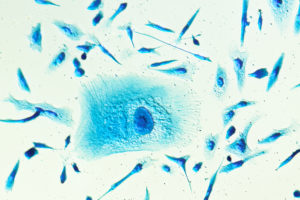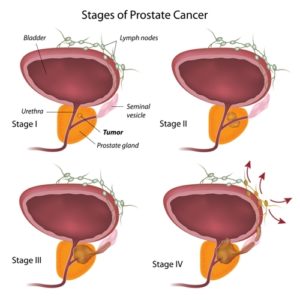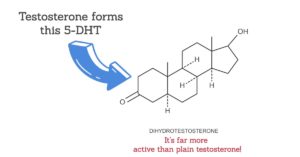What's On This Page?
ToggleFew words strike more fear than the word “cancer” and today’s article is devoted to helping you find out what critical metabolites should be evaluated. Prostate cancer is very common in the United States and was responsible for over 34,000 deaths in 2021 according to Cancer.org.
Early in the course of prostate cancer, before it’s even known, the growth of cancer cells is kept in check by natural, normal pathways in the body, usually those under the control of testosterone and related hormones known as androgens. These reproductive hormones deliver one signal to the prostate cancer cell telling them to “be fruitful and keep multiplying.”
With continued replication, the cells pour out a protein called “prostate-specific antigen” dubbed PSA. When the PSA levels are measured in a blood test and seen as abnormal (above the normal reference range), the doctors worry this is the first sign of possible prostate cancer.

Testing for PSA levels isn’t nearly enough. Neither is testing for testosterone levels, or DHT. There’s so much more, and thankfully doctors can test you using urine “at home” test kits now. I offer these at my website too.
But right now, what I’d like to do is make sure you’re fully armed with the knowledge of important (measurable) biomarkers that are often overlooked as there’s so much hyper focus on PSA and DHT and a few others. Overlooking any one of the following could lead to more complications and progression of cancer at a faster rate. Testing yourself properly is important to your health and longevity. In no particular order of importance, here’s what you should be tracking:
Vitamin B12.
We know that a deficiency B12 may results in erectile dysfunction, and poor coordination, as well as higher neuropathy pain. It is unclear if this is from the resulting elevation of homocysteine or some other mechanism.

What about prostate cancer?
The studies aren’t the best, so it’s hard to draw a straight line in the sand about it, however, high levels of B12 may hasten the progression of existing prostate cancer. Levels should be adequate and normal, but not high. Your physician can easily test for this. Vitamin B12 is made in your gastrointestinal tract if you have healthy gut microflora, so you don’t necessarily have to supplement, and again, in some studies, there is a positive correlation of B12 levels that suggests higher risk of prostate cancer. The same studies suggest that selenium is protective, as is Vitamin D and lycopene.
Glutathione.
Unlike B12 where high levels might be bad, it’s the opposite with glutathione. Higher levels of glutathione are protective and useful as an antioxidant. This is pretty simple because in prostate cancer patients, antioxidant defenses are significantly attenuated, so restoring that could be useful. We’ve seen studies that are reproducible that show the same thing… that glutathione is really good. I can’t say it’s for cancer, because it’s not… only drugs treat cancer. But what I can say is that glutathione is an antioxidant and it supports healthy liver function* and if it does that, it can do good housekeeping on your DNA* and protect various cell lines.*
Measuring oxidative stress on cancer cell lines (even breast cancer), have sown that there’s more oxidation and damage done. Specifically, peroxide is generated and it can overcome a cell and destroy it. Only glutathione (and catalase) can break down peroxide, so these offer antioxidant protection.*
Melatonin.
Your pineal gland in your head secretes a lot of this hormone in response to night time, but it’s also made in the gut, and in the retina of your eye.
It has anti-cancer activity when it comes to prostate cancer according to this STUDY entitled, Antiproliferative action of melatonin on human prostate cancer LNCaP cells. There was another interesting article I read about mindfulness meditation, and how it could increase melatonin. It’s in this really old scientific ARTICLE from 1995 and so this info has been out there a very long time! If you can make more of your own melatonin by doing more relaxing, mediative hobbies (as opposed to stressing out with the news every day), your cancer risk may go down. Does that sound like a stretch to you? It isn’t a stretch because melatonin is one of your body’s strongest anti-cancer compounds ever!
Testosterone.
There are books on the role of testosterone and how this hormone itself, as well as its metabolites impact prostate function, fertility and cancer risk. I cannot attempt to summarize it here, but what I can say is that many oncologists prescribe drugs to treat prostate cancer, and these drugs specifically seek to stop the male hormone testosterone from being produced, or from reaching the cells in the prostate glands.
We also know that men who have higher testosterone levels often have higher PSA levels too.
I want to be careful that I do not imply that higher testosterone increases prostate cancer, it doesn’t otherwise every 18 year old man brimming with testosterone would be struck down with prostate cancer. So it is more the metabolites of testosterone, not the hormone specifically itself. This is why urine metabolite testing is so important and why I’ve advocated that for you throughout my career. In other words, a spot check of testosterone in the morning via blood isn’t as telling unless you also have the metabolites from a urine test to compare with it. CLICK HERE to get that test.
There have been various studies over the years, and not all of them concur. There was a meta-analysis published in 2016 that found “no relationship” between a man’s testosterone level and risk for developing prostate cancer. That makes sense to me, it’s likely the metabolites as I’ve explained above. It’s what the testosterone BREAKS INTO that matters not the level itself, per se. In case you don’t remember, testosterone breaks into estrogen and there are several types of estrogen metabolites, some of which promote cancer, and others protect you from it. You can test for your metabolites with the DUTCH test by CLICKING HERE. xxx It’s an at-home test kit.
Estrogen Metabolites.
As a man facing a new diagnosis (or fear of) prostate cancer, I’m betting that estrogen levels are the last thing on your mind!
That’s a female hormone, isn’t it?
Yes, it is.
But men make estrogen as well, it is the breakdown product (the metabolite) of testosterone. Estrogen comes in three different forms in the human body.
If you’re interested in reading my ebook about this CLICK HERE.
It’s a bit complicated, but I think I did a great job at explaining how it all works. The ebook is of course FREE (all my educational resources are). You can learn more about the three different types of estrogen metabolites. My point here is that a person diagnosed with prostate dysfunction or any reproductive illness should evaluate their estrogen metabolites. Yes “metabolites” not levels. The estrogen level doesn’t matter as much as the estrogen metabolites. This can only be done with urine testing, not blood.
Some doctors assert that there are predictive biomarkers for prostate (and breast, and for that matter other reproductive) cancer. For example, the 4-hydroxyestrone compared to the 2-hydroxyestradiol and there’s a 16 and so forth. I don’t want to complicate this, but I want you to know that some metabolites of estrogen are more predictive of reproductive cancers while others are more protective.
Estrogen metabolites are something you can modify with supplements and diet. These metabolites are easily measurable with an at-home test kit called DUTCH which I sell at my shop. You get your own results via email and you can share with your physician. Your own doctor can order it too, he/she has to just become a Provider with the laboratory, and then once that’s set up, he/she can give you the test which you take home to do.
In summary, the endogenous estrogen metabolites that you make when you break down estrogen can either promote cell cancer proliferation, or protect against it, or just be neutral. But knowing what you body does is critical because you can modify it. If you have prostate cancer, or a high risk of developing it, then testing your estrogen metabolites is critical. In my humble opinion, it’s equally important to knowing your estrogen and testosterone levels. According to the Journal of Experimental and Clinical Cancer Research certain ratios of these estrogens correlated with increased prostate cancer risk.
5 DHT
There was a STUDY in Frontiers in Oncology regarding prostate cancer and androgens. Excessive amounts of DHT has been implicated in enlarged prostate as well as prostate cancer. This is a pathway that doctors frequently block to prevent the production of excessive DHT.
The enzyme known as 5-alpha-reductase is what converts testosterone into DHT. And the DHT is a bit sticky, it attaches to cells very easily, it doesn’t want to get off, and it’s far more powerful than testosterone. It does a lot of damage to people when it’s excessive. The DUTCH test xxx can evaluate levels of this metabolite too.
Cortisol.
Researchers know that abnormally high amounts of cortisol lead to belly fat. But it’s also true that this stress hormone (along with cortisone) can spur growth of prostate cancer cells, and make it especially challenging for people who are resistant to other commonly employed cancer treatments. This was outlined in greater detail in a Stanford Report over 20 years ago!
Controlling stress (and thus cortisol) is good for your prostate, especially if you’re genetically prone to binding that cortisol to androgenic receptors. There are mutations in the human body that some men have which change how the receptor for androgen looks on the cell. It makes it such that cortisol and cortisone can bind to the key hole and act just like an androgen. These mutations can fuel cancer growth because the receptors suddenly respond improperly to cortisol, cortisone and other related hormones.
“These two mutations changed the androgen receptor structure so that now cortisol and cortisone could bind to the mutated receptor and act like ‘pseudo-androgens,’ ” Feldman said. Presumably, the mutations contorted the receptor molecule into a new shape that closely matched the shapes of cortisone and cortisol.
By recreating the mutant receptors in the laboratory, Feldman and his colleagues proved that the double mutation converted the androgen receptor into a receptor that responds inappropriately to cortisol, cortisone and other hormones. Since the study was a test tube study, they basically poured more and more hormones in and as you might expect, the cells decided faster and they spit out more PSA. How common are these mutations in men? We honestly don’t know, that part was not researched because it wasn’t a human study.
What is fair to say is that blocking androgen receptors is important. And furthermore, knowing your levels of androgens is even more useful. The higher the androgens (above normal) the more risk for proliferation. There’s more information at the Mayo site about hormone therapy.
Cortisol may affect PSA levels too. Men with lower cortisol levels were evaluated and had lower PSAs generally speaking, compared to men with higher cortisol numbers (who had higher PSAs).
Please see a qualified physician who understands bio-identical hormones and hormone therapy. If you have cancer, make sure to keep your oncologist appointments and to share this article as well. The important thing is to keep in mind that when your cells ‘listen’ to the wrong metabolites, or androgen hormones, the prostate cancer can grow faster.
The same holds true for any reproductive cancer. This is why metabolite testing is absolutely critical, and you should start testing yourself annually, even if you are well! Here is a LINK to learn more about the test since I am allowed to offer it to you. I am a qualified, licensed Provider for DUTCH testing, and since I don’t have a clinic, I just sell it online directly to consumers.
If you are interested in more articles on this topic, I’ve written a few related ones:
- Estrogen is Essential to Be Headache Free
- How to Balance Your Hormones
- Male Hormones Help Improve Female Sex Drive

Suzy Cohen, has been a licensed pharmacist for over 30 years and believes the best approach to chronic illness is a combination of natural medicine and conventional. She founded her own dietary supplement company specializing in custom-formulas, some of which have patents. With a special focus on functional medicine, thyroid health and drug nutrient depletion, Suzy is the author of several related books including Thyroid Healthy, Drug Muggers, Diabetes Without Drugs, and a nationally syndicated column.

